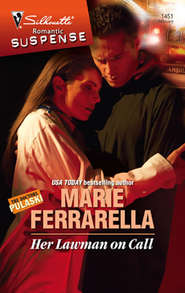По всем вопросам обращайтесь на: info@litportal.ru
(©) 2003-2025.
✖
The Doctor's Forever Family
Автор
Год написания книги
2019
Настройки чтения
Размер шрифта
Высота строк
Поля
Putting her memories behind her, Miss Joan shifted her attention to the present and the reason that her diner was filled to overflowing.
“Well, it looks like everybody’s here who’s going to be here,” she decided, then announced to the sheriff and his wife, as well as to several people who could actually hear her without her resorting to a microphone, “That means it’s time to bring out the cake.”
“Cake?” Alma Sanchez, one of Rick’s other deputies piped up, coming closer to her boss and the diner owner. For a woman who had a continuing love affair with all manner of sweets, with pastries at the top of the list, Deputy Alma Sanchez was an exceedingly petite, trim woman. “Did someone say cake?”
“Of course I said cake,” Miss Joan underscored. “You can’t expect to welcome someone properly without having baked a cake in his honor.”
The diner owner’s hazel eyes darted back and forth, taking Rick into account and then zeroing in on Joe, another young boy she’d watched grow to manhood, fulfilling the promise he’d projected years ago. She had no children of her own, but viewed so many of the town’s younger citizens as her own.
Joe was standing a few feet away, talking to his fiancée. She needed to borrow him for a few minutes. “Rick, Joe,” she called, raising her voice, “I need a couple of men with strong backs.”
“Thinking of taking them back to your place, Joan?” Mac Tyler called out, laughing at the joke he thought he’d just made.
“Better them than you, Mac, that’s for sure,” Miss Joan fired back without missing a beat. “If that man’s ego was any bigger,” Miss Joan confided to Olivia in tones that were not as hushed as they could have been, “he wouldn’t be able to get his head through a single doorway.”
Mac Tyler had also been sniffing at her heels for the longest time and at this stage of her life, she still hadn’t made up her mind if she wanted to make something of it or not. She couldn’t decide if Tyler was worth the trouble or the effort.
“C’mon, boys,” Miss Joan gestured to the sheriff and his senior deputy, “I’ve got a cake I need you to bring out of the walk-in.” Glancing over her shoulder, she addressed her words to the people in the diner. “Nobody even think about making a move toward the door. I’m bringing out the cake.”
Appreciative murmurs greeted her declaration. Everyone knew that Miss Joan’s cakes were conceived in heaven and given an earthly form as an afterthought. Rick’s late grandmother, a woman not easily given to offering compliments, had once asked Miss Joan how she kept her cakes from floating away.
As Miss Joan left the room, leading the way for her two helpers, Dan turned to Tina and asked, “She always take charge like that?”
There was more than a little affection in her expression as Tina’s mouth curved. “Actually, this is one of Miss Joan’s more laid-back days,” she said with an amused laugh.
Dan hardly heard her answer. The din in the diner had swallowed them up without so much as a telltale trace. He was forced to watch her mouth again in order to hear what she’d said.
He didn’t really mind.
Chapter Four
“This is it?”
Disbelief permeated Dan’s every syllable. It was a struggle not to allow his mouth to drop open in sheer, stunned amazement.
What the hell did I just get myself into?
That was his initial reaction to the two-story, ram-shackle seventy-five-year-old building that was to serve as both his home and the medical clinic. The ground floor was devoted to a couple of exam rooms, an office he could barely stretch out in and a reception area. The second floor was where the last doctor had lived thirty years ago.
Joe had once again volunteered to be his guide and had brought him here, leading the way in his Jeep, after the welcoming party had wound down. When the deputy had come to a stop before this building, Dan had followed suit. He’d gotten out of his sedan in what felt like surreal slow motion. His eyes were riveted to the dark, inhospitable and, undoubtedly, rotting building.
Dan felt like someone trapped in a nightmare he could only hope would end quickly. Except that it showed no signs of ending any time soon. The building loomed before him like a refugee from a bad, grade B, 1950s horror movie. All that was needed were bats.
Joe shifted ever so slightly, picking up on the other man’s disbelief. In comparison to what he’d known, the old building was in good condition.
“Yeah, this is it,” Joe acknowledged.
Still stunned, Dan turned to the deputy. Maybe this was some kind of a hazing, a prank the town was playing on “the new guy.” How was he supposed to work with this? The place probably leaked when it rained. And if it looked like this on the outside, what did it look like inside? What kind of equipment would he find?
Would he find equipment?
“You’re kidding,” he said to Joe, in fervent hopes that the stoic man had a warped sense of humor.
Joe’s tone was low, soft. Soothing. “It doesn’t look like much now—”
Now, there was a world-class understatement. “Did it ever?” Dan asked, cutting in.
How the hell was he supposed to work in a place like this, much less live in it?
Granted, he was accustomed to places like his late uncle’s spacious house in the Hamptons or the Fifth Avenue apartment that he and Warren had shared during their residency at NYU. Maybe that might have made him a snob in some people’s eyes. But there had to be a happy medium between where he’d come from and this.
The place looked hardly worthy of the label Rundown Shack. He had strong suspicions a massive collection of termites holding hands kept the walls up. If they ever let go, the walls, not like at Jericho, would come tumbling down without any kind of a warning.
He recalled that Warren had seen photographs of the place. The diner woman, Miss Jane or Joan or some name that began with a J, had sent them to him. His brother had never showed the photos to him, but he’d been excited about “the possibilities.”
The only possibility Dan saw was if the house was knocked down and someone started from scratch. And even then, he wasn’t so sure.
How could Warren have willingly agreed to live in this house? In this town? There was dedication and then there was insanity.
“Yeah,” Joe answered his question about what the building had looked like once. “It did. And with a little work,” he maintained rather firmly, “it can look that way again.”
He’d obviously insulted the man’s sense of loyalty to his place of birth, Dan thought. And he hadn’t meant to, but, hell, hopeless was hopeless. And this was hopeless. “Define a little,” Dan muttered under his breath.
“Okay,” Joe allowed reluctantly, “maybe a lot of work. But compared to the place I grew up in, this house looks pretty decent.”
“You grew up in a homeless camp?” The quip was out before Dan could think better of it.
The solemn man was quiet for a long moment. But it was clear that Joe had taken no offense as he replied, “Almost.”
The deputy sounded so serious Dan instantly regretted the offhanded remark. He hadn’t wanted to be disparaging. People were saddled with poverty through no fault of their own. He’d never been, but he and Warren had been two of the lucky ones—at the time, he amended. Until Warren’s luck had run out.
He could feel his gut twisting.
He’d never been good at apologizing, but he gave it a shot. “Hey, I’m sorry, man. I didn’t mean to—”
Joe held his hand up as if to push any further apologetic words away. “That’s okay. I grew up on the reservation. It’s not all that far from the other side of town,” Joe added in case the doctor was unaware that there was a reservation in the area.
What Joe didn’t bother touching on was any of his history, or the fact that he’d been orphaned at an early age and raised by a more or less disinterested committee of distant relatives, all of whom had felt he was someone else’s responsibility.
“Things turned out okay.” He turned to look at Dan. “And you might not think so now, but this will, too. Things have a habit of turning out around here,” he assured Dan.
Dan sighed, looking at the building again. He hadn’t come here for a vacation, he reminded himself. This was all part of the penance he felt he had to undertake.
He frowned, his eyes sweeping over the structure. No question he would have to find a better place to attend to the patients lining up to see him—and soon. The inside of that building was a breeding ground for every bacteria known—and unknown—to man.
What had Warren been thinking when he’d agreed to put down a bid on this place?
A bid.











